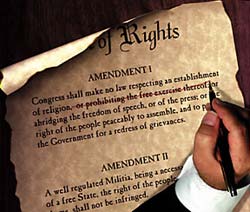 The Bill of Rights, the first ten amendments to the U.S. Constitution, enumerates certain inalienable rights: freedom of speech, freedom of religion, the right of assembly, the right to be secure in our homes and protect our possessions against unreasonable search or seizure, the right against self incrimination (taking the 5th). The Constitution further prohibits the government from depriving any person of life, liberty, or property, without due process of law.
The Bill of Rights, the first ten amendments to the U.S. Constitution, enumerates certain inalienable rights: freedom of speech, freedom of religion, the right of assembly, the right to be secure in our homes and protect our possessions against unreasonable search or seizure, the right against self incrimination (taking the 5th). The Constitution further prohibits the government from depriving any person of life, liberty, or property, without due process of law.
I call these “natural” rights because they require that the government prohibit anyone, including the government, from doing bad things to you. These rights allow you the freedom to be left alone, to make of your own life what you will.
In the past few decades some have declared that certain new “rights” exist, which I call “artificial” rights. These consist of the “right” to education, the “right” to housing, the “right” to health care. All of these represent the fruit of someone else’s labor and are far from free. The nurse, the teacher, the carpenter all must be paid.
These new artificial rights differ greatly from natural rights in that they require someone to do something positive for you versus simply refraining from doing bad things to you. Typically these artificial rights are expensive and those espousing them are usually vague about who is going to pay for them other than “the government.”
It would be fine if these artificial rights were put forth in the context of a social contract with mutual obligations: I will pay for your health care while you are sick if in turn you promise to pay it back when you are well so I can enjoy the same privilege.
I would be the first to agree that we all have a moral duty, an ethical obligation, to help those less fortunate then ourselves, to be Good Samaritans. However, those in need have equally important duties and obligations:
– To do all within their power to avoid being a burden to others
– To take only what they need, only when they truly need it
– To pay it back as soon as possible
Unfortunately, by labeling assistance a right, any sense of personal responsibility or obligation to repay the resources consumed is removed.
In the long run, there is no such thing as a free lunch. Someone, somewhere is going to have to pay. Everyone wishes to live at the expense of the government, conveniently forgetting that the government lives at the expense of everyone. The only “right” we may have to aid others is if the government (the collective we) does dole out aid, it (we) must do so in a fair and equitable manner.
To claim that anyone has a right to the fruit of another’s labor is the worst kind of sophistry.


0 Comments